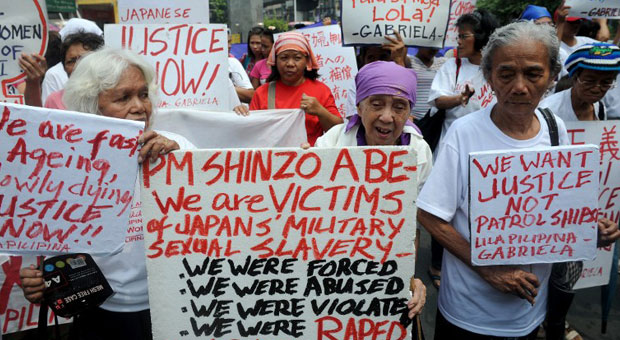Japan mulls revision of comfort women apology

Elderly women join a group who say they were used as sexual slaves by Japanese soldiers during World War II, commonly referred to as ‘comfort women’, during a rally near Malacanang Palace where the Japanese Prime Minister Shinzo Abe met Philippine President Benigno Aquino in Manila on July 27, 2013. AFP FILE PHOTO
SEOUL — Japan is to consider revising its landmark apology for its wartime system of sex slavery, a top official said Monday, in a move likely to draw fury in South Korea and beyond.
Evidence given by “comfort women” — those forced to work in military brothels — that forms the basis of the 1993 Kono Statement, is to be re-examined, Chief Cabinet Secretary Yoshihide Suga said Monday.
“The testimonies of comfort women were taken on the premise of their being closed-door sessions. The government will consider whether there can be a revision while preserving” the confidence in which they were given, Chief Cabinet Secretary Yoshihide Suga said.
Suga’s comment came after a weekend opinion poll, jointly conducted by the nationalistic Sankei Shimbun daily and Fuji TV, in which 59 percent of respondents said the apology should be revised.
Most recently, the issue was further inflamed when Katsuto Momii, the new head of Japan’s national broadcaster NHK, said sex slavery was common in many militaries and was only wrong when judged against modern morality.
Respected historians say up to 200,000 women, mostly from Korea but also from China, Indonesia, the Philippines and Taiwan, were forced to serve as sex slaves in Japanese army brothels.
However, a minority of right-wing Japanese insists there was no official involvement by the state or the military and say the women were common prostitutes.
In 1993, after hearing testimony from 16 Korean women, a statement issued in the name of then-chief cabinet secretary Yohei Kono acknowledged official complicity in the coercion of women into sex slavery.
It offered “sincere apologies and remorse” to the women and vowed to face squarely the historical facts.
But repeated wavering on the issue among senior right-wing politicians has contributed to a feeling in South Korea that Japan is in denial and is not sufficiently remorseful.
Last week, Suga told parliament that the government “would like to consider” setting up a verification team with academics who would look again at the 16 women’s accounts.
On the same day, Nobuo Ishihara, former deputy chief cabinet secretary who played a key role in working out the Kono statement, told parliament that Japan had conducted no checks on the former comfort women’s accounts to verify their stories.
“There were no materials that directly substantiate forcible recruitments by the Japanese government or by the military, but considering their testimonies we could not deny there was that sort of conduct among recruiters,” he said, adding it could not be denied either that the authorities were linked to the recruiters.
Ishihara said the 1993 statement was meant to settle the bitter past and encourage a more forward-looking relationship with South Korea.
“It is very regrettable that the goodwill of the Japanese government has done no good”, he said, reflecting a frustration felt by many in Japan who feel that the sex slavery issue will always be a stick that Seoul can use to beat it.
RELATED STORIES
Japan mayor told: Watch your mouth on comfort women